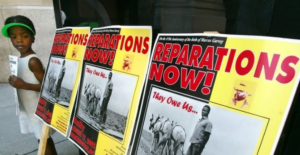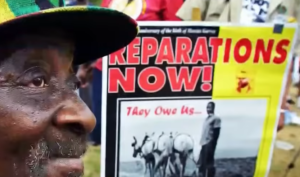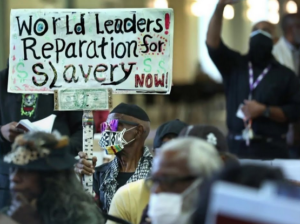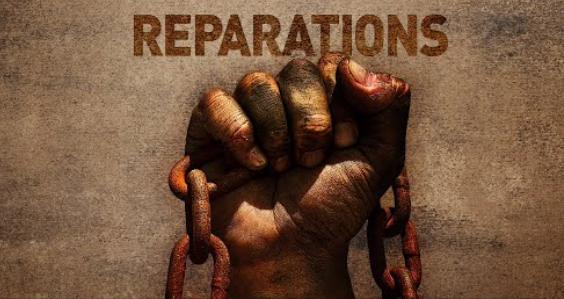Photos: YouTube Screenshots
BOSTON—September 27, 2023—In a just released set of two companion articles — “Philanthropy’s Role in Reparations and Building a Culture of Racial Repair” and “A Reparations Roadmap for Philanthropy,” The Bridgespan Group in collaboration with Liberation Ventures, has mapped out both the case for philanthropy to play a pivotal role and a set of tangible steps it can take to advance equity and a better future for all by supporting the movement for Reparations.

According to Bridgespan Partner and Co-author of the research Tonyel Edwards, “One of the big misconceptions about reparations is that it is a discussion stuck in the past—only about history long ago rather than an investment, perhaps the investment, in the future. Reparations and the repair that comes with it offer an opportunity to transform ourselves, our communities, and our nation.”
Edward’s Co-author Aria Florant, the co-founder and CEO of Liberation Ventures says, “The time for such an effort is now. As the baby Boomer generation passes away, an estimated $84 trillion is projected to be passed down to heirs, with some $16 trillion transferred in the next decade alone. To put that in perspective, that’s 43 percent more than what it would take to eliminate the entire Black-white wealth gap. Rather than reinforcing the nation’s inequity, philanthropy could leverage this wealth transfer to set a new path.”
Today, in the United States, if the wealth of white households remained stagnant, it would take Black families 228 years, or ten generations, to catch up.
“Because of America’s history of race-based policy designed to build white wealth at the expense of Black wealth, many funders, as well as some movement leaders and scholars, come to the work of Reparations through an interest in addressing the racial wealth gap,” says Alex Williams, a co-author of the articles and former Bridgespan senior manager. As reported by Dr. William Darity in a 2021 New York Times article, the Black-white wealth gap is $11.2 trillion. Closing it would add between $1 trillion and $1.5 trillion in GDP to the US economy. And, according to a 2021 McKinsey & Company study, there is a $330 billion disparity in wealth flow between white and Black families every year, and intergenerational wealth transfer drives 60 percent of that disparity.
“While closing the racial wealth gap is an important part of what Reparations can bring,” says Edwards, “our research also highlights the importance of non-financial forms of repair, including systems-level reparative policy, and the role philanthropy can play in supporting that. Public discourse on reparations for Black Americans tends to focus on dollar amounts and who exactly would be paid,” however,” says Edwards, “Unfortunately too often that conversation focuses only on the price tag, and out of context, it turns into a shock and awe approach that paralyzes the broader discussion into a state of impossibility.”

The research highlights additional pathways for philanthropy to advance this work. “First,” says Florant, “it is important to acknowledge a core tension in raising the issue of philanthropy’s role in reparations. The accumulation of wealth over time that underlies large-scale philanthropy is fueled by the same systems and policies that have systematically excluded Black people from similarly building wealth.” According to the authors, this tension is also why philanthropy is poised to be a prime actor to catalyze a culture of repair. They outline three approaches for philanthropy to employ to reckon with their histories, their accountability and how to move forward and offer examples of organizations engaging in these practices:
- Live into a culture of racial repair in your own institution;
- Resource the reparations and repair ecosystem; and
- Increase the use of Black asset managers and Black-owned investment firms with values aligned to building a culture of repair when managing endowments.
According to co-author and Bridgespan senior editorial director Cora Daniels, “There are always those who say some issues are too big or tough to change, but philanthropy has proven the naysayers wrong before. Think about the journey to marriage equality.” The authors point to a Pew Research Center poll conducted in 2004 that found that only 31 percent of US adults favored same-sex marriage. A decade later, marriage equality became the law of the land. In 2022, another Pew study found that overall support for reparations is 30 percent—about the same level once in favor of same-sex marriage. “It is a sign that, with the right strategy and funding, we could be at a similar inflection point,” Daniels says.
Edwards sums up a key objective of the research, “Currently there is a broad ecosystem of grassroots organizations, nonprofits, artists, scholars, multiracial coalitions, leaders of color, and, yes, funders working across the United States who see Reparations for Black people and creating a culture of racial repair as the missing piece to get to that better world, for everyone. They deserve our support.”

About The Bridgespan Group
The Bridgespan Group (www.bridgespan.org) is a global nonprofit that collaborates with social change organizations, philanthropists, and impact investors to make the world more equitable and just. Bridgespan’s services include strategy consulting and advising, sourcing and diligence, and leadership team support. We take what we learn from this work and build on it with original research, identifying best practices and innovative ideas to share with the social sector. We work from locations in Boston, Johannesburg, Mumbai, New York, and San Francisco and Singapore.
About Liberation Ventures
Liberation Ventures is building a multiracial democracy that works for all of us — by making racial repair a reality in the United States. LV is building the power to win federal, comprehensive reparations for Black Americans by supporting the field of organizations across the country who are building momentum toward that north star. LV’s work includes three pillars: mobilizing financial resources into the reparations movement, building narrative power, and strengthening relationships and connective tissue to build movement capacity. LV was founded in April 2020, and is led by Aria Florant. Learn more about our plans and current priorities here, and read about our vision for racial repair in the US here.





